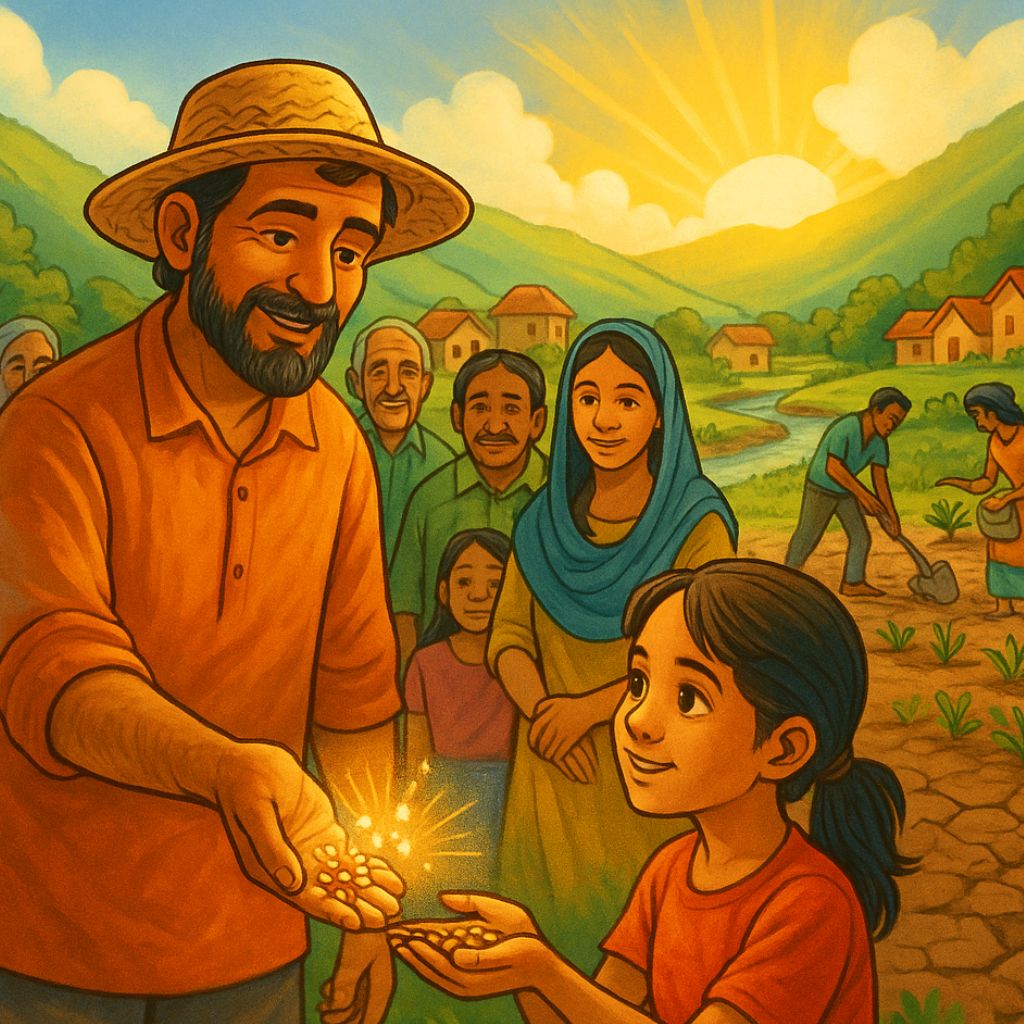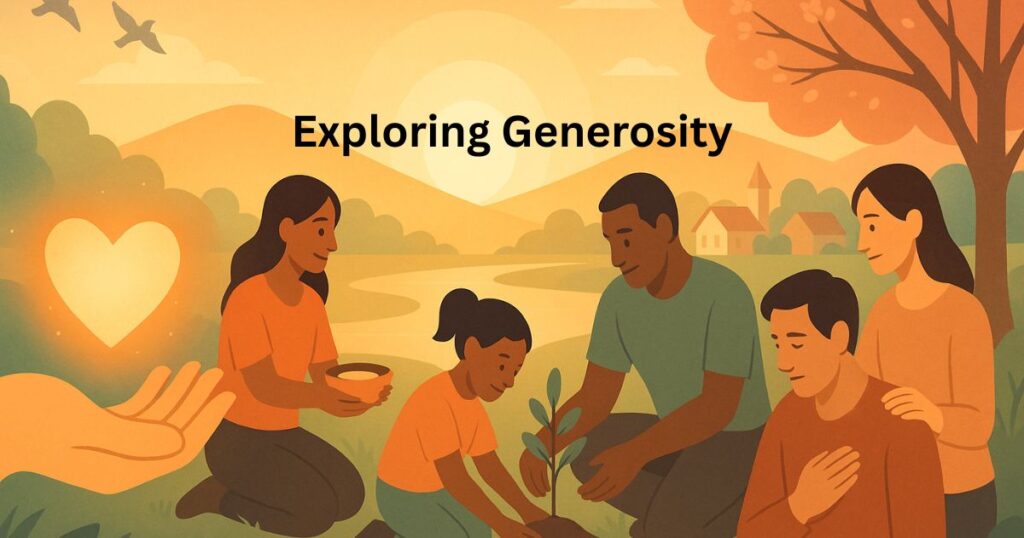Introduction
Generosity is an act of kindness and selflessness. It is the readiness to offer oneself without anticipating anything in return, be it love, time, money, or attention. This trait of spirit demonstrates a greater awareness of human interconnectedness and goes beyond just transactional dealings. The idea that giving improves both our own and other people’s lives is embodied by generosity. It is a quality that promotes empathy, community, and a feeling of our common humanity.
Philosophical Aspects of Generosity
Philosophically, generosity challenges the egocentric view, which places the self above others. Instead, it invites us to see ourselves as part of a larger whole, where our actions have the power to ripple across lives and communities. This view aligns with philosophical teachings that emphasize the importance of altruism and the interconnectedness of all beings. By practicing generosity, we acknowledge the intrinsic value of others and our responsibility towards them.
Generosity is not limited to material gifts; it extends to intangible offerings such as patience, encouragement, and empathy. It is about being present for others, listening deeply, and offering support even when it is inconvenient. This kind of generosity requires emotional resilience and a conscious effort to cultivate kindness in our daily interactions.
The philosophical roots of generosity can be traced back to various cultural and religious traditions. In Buddhism, the concept of “dāna,” or giving, is considered the first step on the path to enlightenment. Similarly, in Christianity, generosity is viewed as a reflection of divine love, urging believers to “give, and it will be given to you.” In Islam it is a fundamental teaching that is encouraged to get salvation on the Day of Judgment. These teachings highlight that generosity is both a personal virtue and a social imperative, encouraging individuals to look beyond their immediate concerns and contribute to the welfare of others.
Generosity intersects with the concept of justice and calls for the equitable distribution of resources and opportunities. It challenges systemic inequalities and prompts us to question how we can use our privileges and assets to uplift those who are less fortunate.
“The Seeds of Tomorrow”

In a quiet village cradled by emerald hills and whispering rivers, a humble farmer named Rohan lived a life of simplicity and grace. His fields, kissed by the sun and nurtured by his hands, bloomed with crops that fed not just his family but anyone who knocked on his door with empty hands and a heavy heart. Rohan’s generosity was a quiet force, as natural as the seasons, woven into the fabric of his being.
But then came a drought, merciless and unrelenting. The vibrant fields cracked like broken promises, and the river, once a lifeline, shrank to a feeble trickle. Hunger crept into the village, and despair settled over the people like dust. Families watched their crops wither, their hopes fading with every parched day. Yet, in the face of this devastation, Rohan’s spirit remained unbroken. He carried a secret—a small, weathered box of rare seeds, a gift from his grandfather, saved for a time when all seemed lost.
One evening, under a sky bruised with twilight, Rohan stood in the village square, his voice steady but warm, like a hearth fire. “These seeds,” he said, holding up the precious heirlooms, “can withstand this drought. If we plant them together, we can survive—no, we can thrive.” His eyes shone with a quiet conviction that stirred the crowd, though doubt lingered in their whispers. Some called him reckless, risking his family’s legacy on a gamble. Others wondered if such small seeds could defy the relentless sun.
Undeterred, Rohan shared his treasure freely, handing seeds to every willing hand. He offered not just the seeds but his knowledge, teaching the villagers how to coax life from the stubborn earth. Among them was Meera, a young girl with eyes bright with determination. Her family had lost nearly everything, their pantry as barren as the fields. Yet, in Rohan’s generosity, she saw a spark of hope—a chance to fight for her family’s future. With trembling hands, she planted her seeds, tending them with a care that mirrored Rohan’s own.
Weeks passed, and the impossible happened. Tiny green shoots pierced the cracked soil, defiant and alive. The village, once cloaked in despair, began to glow with patches of green—proof that hope could take root even in the harshest conditions. Rohan’s seeds didn’t just grow crops; they grew trust, unity, and a renewed sense of purpose. Neighbors who once hoarded their dwindling resources now shared tools, water, and encouragement. The village pulsed with a collective heartbeat, bound by the belief that together, they could overcome.
Rohan’s gift rippled beyond survival. It wove the villagers into a tapestry of resilience and compassion. Meera, forever changed by his example, found her calling. She grew into a fierce advocate for sustainable farming, traveling far beyond the village to teach others how to nurture crops that could withstand a changing world. Her work brought food and prosperity to countless communities; each seed she planted was a tribute to the man who showed her what generosity could do.
Years later, Rohan sat on his porch, the fields before him swaying in a gentle breeze. His heart swelled with quiet pride—not for himself, but for the legacy of hope he had sown. His single act of giving had sparked a movement, a chain of kindness that stretched far beyond the hills he called home.
The power of generosity is a force that transcends scarcity and fear, igniting hope where despair once reigned. In a world often divided by want, Rohan’s story reminds us that giving, even when it feels risky, can transform lives. We may not all have seeds to share, but we have time, love, and compassion to offer. Every small act of kindness plants a seed, capable of growing into something extraordinary.
Let us be like Rohan, daring to give when it matters most. Let us nurture generosity in our hearts, knowing that each act of giving weaves us into the greater story of humanity. In sharing what we have, we cultivate a world where hope flourishes, where no one stands alone, and where the seeds of tomorrow bloom with promise.


